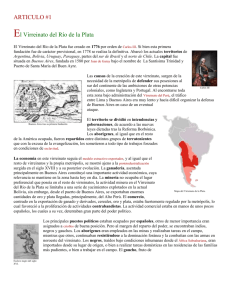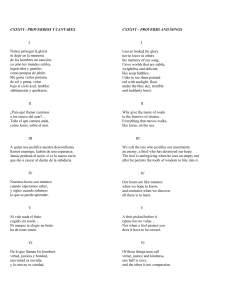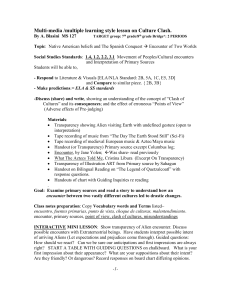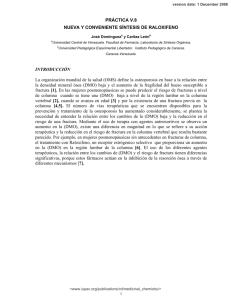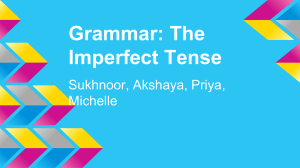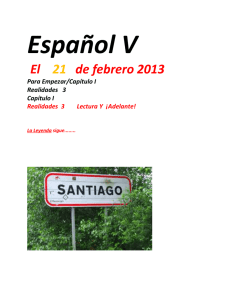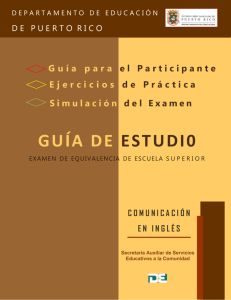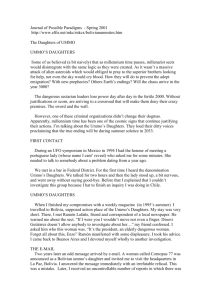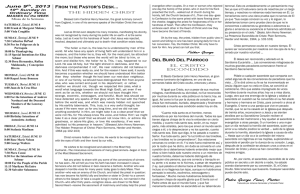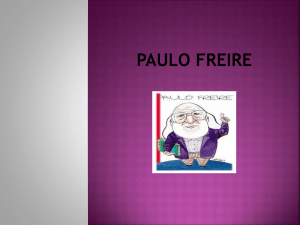Preparación para Exámenes de Ingreso
advertisement
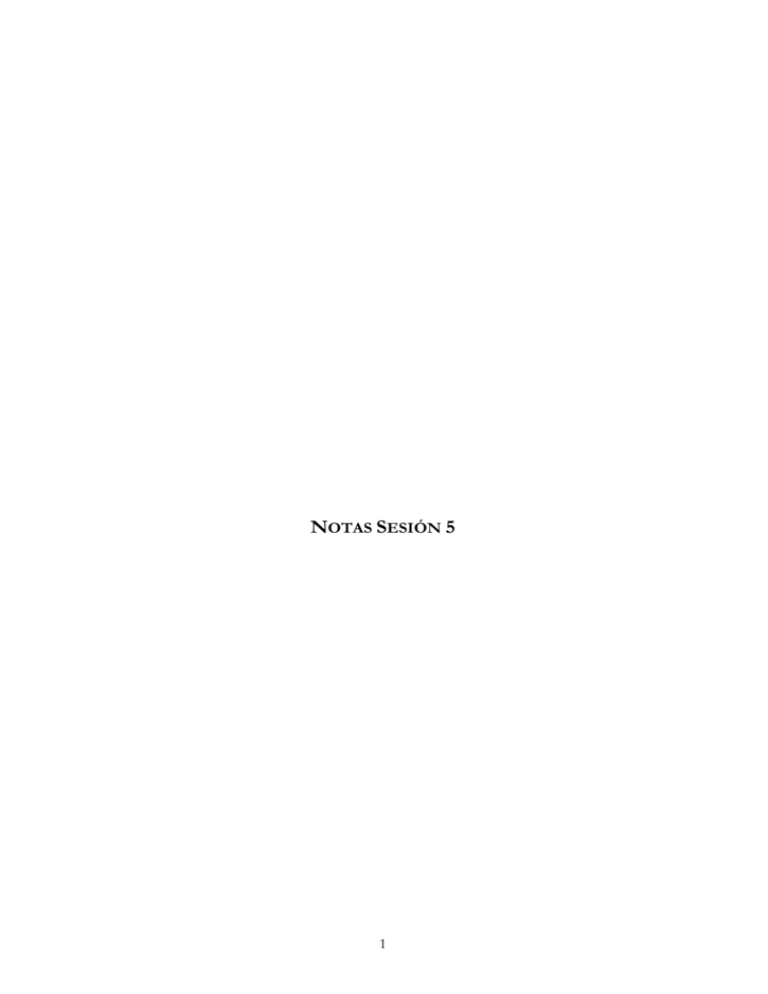
NOTAS SESIÓN 5 1 2 EXÁMENES DE INGRESO A los exámenes de ingreso generalmente se los relaciona con la aplicación a universidades de 4 años. Si su hijo(a) decide transferirse de un colegio comunitario de 2 años a una institución de 4 años no se requiere que tome el examen SAT o ACT, sin embargo, se puede requerir que tome exámenes de ingreso asociados con la universidad que escogió y generalmente dichos exámenes no deben ser pagados. El TOEFL es una excepción ya que muchas instituciones, incluyendo colegios comunitarios, requieren que los estudiantes que No son Anglo-parlantes tomen dicho examen. Es importante que los padres y estudiantes verifiquen con la institución que desean acudir si se requiere tomar el examen TOEFL. ACT (American College Testing - Examen Americano para Universidades) El ACT (sin incluir el Examen de Escritura) es una serie de 4 exámenes de opción múltiple que cubre las materias de Inglés, Matemáticas, Lectura y Ciencias. El “ACT Plus Writing” (ACT Más Escritura) incluye los cuatro exámenes de opción múltiple más un Examen de Escritura. Prácticamente todas las instituciones y universidades aceptan los resultados del examen ACT. Las preguntas se relacionan directamente a las materias que los estudiantes aprendieron en la escuela secundaria. Los estudiantes pueden tomar el examen todas las veces que deseen. El examen ACT utiliza el sistema de puntaje de 1-36 (el puntaje promedio en este examen en el 2006 fue de 21.1). El ACT incluye 215 preguntas de opción múltiple y toma aproximadamente 3 ½ horas para terminarlo (incluyendo descansos); o más de 4 horas si se incluye el Examen de Escritura. * El costo de este examen es de $31 (sin Examen de Escritura) o $46 (con Examen de Escritura) e incluye la emisión del puntaje obtenido hasta cuatro instituciones o universidades. Para más información acerca del ACT visite http://www.act.org/. PSAT (Pre-Scholastic Assessment Test – Examen de Evaluación Pre-Académico) El PSAT es un examen estándar que mide las habilidades de lectura crítica, resolución de problemas y de escritura. Generalmente lo toman los estudiantes de tercer año de la escuela secundaria (junior year) como práctica para el examen SAT. El PSAT no es requerido por las universidades, sin embargo, le da a los estudiantes la oportunidad de practicar sus habilidades para tomar el examen, así como, la oportunidad de entrar a los programas de beca de NMSC (National Merit Scholarship Corporation – Corporación –Beca al Merito Nacional). Los estudiantes que toman el PSAT también pueden pedir información sobre las universidades que seleccionen. * El costo del SAT es de $13. Para más información visite http://www.collegeboard.com/student/testing/psat/about.html SAT (Scholastic Assessment Test – Examen de Evaluación Académico) Los exámenes de Razonamiento y Materias SAT son aceptados por casi todas las universidades como parte de sus procesos de admisiones. El Examen de Razonamiento SAT mide las habilidades de pensamiento crítico a través de ensayos, opción múltiple, y preguntas para llenar los espacios en blanco. Este examen dura 4 horas. El Examen de Materias SAT tiene 3 secciones y 3 puntajes, cada uno con una escala de 200 a 800 puntos: Escritura (200-800), Matemáticas y Lectura Crítica (200-800). El puntaje promedio es 1400 puntos. Este examen es de aptitud y mide el conocimiento y las habilidades en el área de una materia específica; dura 1 hora y es de opción múltiple. Los estudiantes pueden tomar el examen SAT todas las veces que deseen. Algunas universidades piden que los estudiantes a más de tomar el Examen de Razonamiento SAT también tomen el Examen de Materias SAT. *El costo del Examen de Razonamiento SAT es de $45 y del Examen de Materias SAT es de $20. 3 Los estudiantes de bajos recursos frecuentemente son elegibles para tomar el examen sin pagar. Generalmente los estudiantes que están inscritos en el programa de almuerzo gratuito o precio reducido pueden obtener una exención de sus consejeros y pueden terminar pagando muy poco o nada por el examen. De igual forma, pueden obtener exenciones para aplicaciones gratuitas a universidades! TOEFL (Test of English as a Second Language – Examen de Inglés como Idioma Extranjero) El TOEFL mide la habilidad de personas no nativas para usar y entender el idioma Inglés. Muchas universidades privadas, del estado y colegios comunitarios piden a los estudiantes, cuya lengua nativa no es el Inglés, tomar el examen TOEFL para determinar su competencia en idioma Inglés. Las políticas varían en cada institución por lo que es importante verificar con las universidades que el estudiante está aplicando para saber si se requiere tomar este examen. * El costo del examen TOEFL por Internet es de $150 y el TOEFL en Papel es de $140 Para más información acerca del TOEFL visite www.ets.org/toefl/ PREPARACIÓN PARA EXÁMENES DE INGRESO Existen varios cursos para ayudar a los estudiantes a prepararse para los exámenes de ingreso a instituciones de educación superior; estos cursos preparatorios generalmente tienen ciertos costos. CFNC (College Foundation of North Carolina – Fundación Universitaria de Carolina del Norte) ofrece exámenes de preparación de ingreso sin costo alguno, para más información de CFNC visite http://www.cfnc.org/ 4 PREGUNTAS DE PRÁCTICA PARA EL EXAMEN SAT 1. If Lynn can type a page in p minutes, what piece of the page can she do in 5 minutes? 5. Two cyclists start biking from a trail's start 3 hours apart. The second cyclist travels at 10 miles per hour and starts 3 hours after the first cyclist who is traveling at 6 miles per hour. How much time will pass before the second cyclist catches up with the first from the time the second cyclist started biking? A. 5/p B. p - 5 C. p + 5 D. p/5 E. 1- p + 5 A. 2 hours B. 4 ½ hours C. 5 ¾ hours D. 6 hours E. 7 ½ hours 2. If Sally can paint a house in 4 hours, and John can paint the same house in 6 hour, how long will it take for both of them to paint the house together? 6. Jim can fill a pool carrying buckets of water in 30 minutes. Sue can do the same job in 45 minutes. Tony can do the same job in 1 ½ hours. How quickly can all three fill the pool together? A. 2 hours and 24 minutes B. 3 hours and 12 minutes C. 3 hours and 44 minutes D. 4 hours and 10 minutes E. 4 hours and 33 minutes A. 12 minutes B. 15 minutes C. 21 minutes D. 23 minutes E. 28 minutes 3. Employees of a discount appliance store receive an additional 20% off of the lowest price on an item. If an employee purchases a dishwasher during a 15% off sale, how much will he pay if the dishwasher originally cost $450? 7. Find 0.12 ÷ 1 A. $280.90 B. $287 C. $292.50 D. $306 E. $333.89 A. 12 B. 1.2 C. .12 D. .012 E. .0012 4. If the average of three numbers is V. If one of the numbers is Z and another is Y, what is the remaining number? 8. (9 ÷ 3) x (8 ÷ 4) = A. 1 B. 6 C. 72 D. 576 E. 752 A. ZY - V B. Z/V – 3 - Y C. Z/3 – V - Y D. 3V- Z - Y E. V- Z – Y 5 9. x + y = 15 x – y = 24 1. After practice, the girl's softball team stated, “We're famished!” Famished means Column A - (y) Column B - (-5) A. Fatigued B. Hungry C. Excited D. Ready A. if the quantity in Column A is greater B. if the quantity in Column B is greater C. if the two quantities are equal D. if it is impossible to determine which quantity is greater 2. The newborn baby was enamored with the rattle. Enamored means 10. Column A -The average (arithmetic mean) of v,w,y,x, and z Column B - 70 A. Fascinated B. Happy C. Unsure what to do D. Aggravated 1. _____ of the rainbow were _____ against the bright blue sky. A. Textures, Clear B. Hues, Vivid C. Alabaster, Bright D. Line, Dark E. Hues, Dark A. if the quantity in Column A is greater B. if the quantity in Column B is greater C. if the two quantities are equal D. if it is impossible to determine which quantity is greater 2. The president has a _____ of ______ around him when he makes public appearances. Grammar/Reading A. Catalyst, Individuals B. Barrier, Contrast C. Hedge, Protection D. Derrick, Protection E. Derrick, Limits 1. Everyone in the bank-including the manager and the tellers, ran to the door when the fire alarm rang. A. tellers, ran B. tellers:ran C. tellers, had run D. tellers-ran E. tellers' ran” 3. A small selection of terms was found at the back of the textbook. It was a A. Glossary B. Preface C. Diction D. Kefir E. Prefece 2. To no ones surprise, Joe didn't have his homework ready. A. no ones surprise B. noones surprise C. no-ones surprise D. no ones' surprise E. no one's surprise 6 1. Questions 1-5. A. cosmic B. land C. mental D. common man E. none of the above In the sixteenth century, an age of great marine and terrestrial exploration, Ferdinand Magellan led the first expedition to sail around the world. As a young Portuguese noble, he served the king of Portugal, but he became involved in the quagmire of political intrigue at court and lost the king's favor. After he was dismissed from service to the king of Portugal, he offered to serve the future Emperor Charles V of Spain. 2. Magellan lost the favor of the king of Portugal when he became involved in a political ___. A. entanglement B. discussion C. negotiation D. problems E. none of the above A papal decree of 1493 had assigned all land in the New World west of 50 degrees W longitude to Spain and all the land east of that line to Portugal. Magellan offered to prove that the East Indies fell under Spanish authority. On September 20, 1519, Magellan set sail from Spain with five ships. More than a year later, one of these ships was exploring the topography of South America in search of a water route across the continent. This ship sank, but the remaining four ships searched along the southern peninsula of South America. Finally they found the passage they sought near a latitude of 50 degrees S. Magellan named this passage the Strait of All Saints, but today we know it as the Strait of Magellan. 3. The Pope divided New World lands between Spain and Portugal according to their location on one side or the other of an imaginary geographical line 50 degrees west of Greenwich that extends in a ___ direction. A. north and south B. crosswise C. easterly D. south east E. north and west 4. One of Magellan's ships explored the ___ of South America for a passage across the continent. One ship deserted while in this passage and returned to Spain, so fewer sailors were privileged to gaze at that first panorama of the Pacific Ocean. Those who remained crossed the meridian we now call the International Date Line in the early spring of 1521 after ninety-eight days on the Pacific Ocean. During those long days at sea, many of Magellan's men died of starvation and disease. A. coastline B. mountain range C. physical features D. islands E. none of the above 5. In the spring of 1521, the ships crossed the ___ now called the International Date Line. Later Magellan became involved in an insular conflict in the Philippines and was killed in a tribal battle. Only one ship and seventeen sailors under the command of the Basque navigator Elcano survived to complete the westward journey to Spain and thus prove once and for all that the world is round, with no precipice at the edge. A. imaginary circle passing through the poles B. Imaginary line parallel to the equator C. area D. land mass E. answer not found in article 1. The sixteenth century was an age of great ___exploration. Questions taken from www.testpreview.com 7 8 EL JUEGO DE LOS EXÁMENES DE INGRESO Escoge la respuesta correcta Esta es la cantidad de dinero que los jóvenes de familias de bajos recursos deberán pagar para tomar el examen SAT Ser admitido(a) en la Universidad y obtener Becas Inglés, Matemáticas, Lectura y Ciencias Estos son los nombres de las secciones que se toman en el examen SAT. El puntaje del examen SAT se usa para estas dos cosas El puntaje más alto Los puntajes del SAT/ACT, el GPA y los ensayos El puntaje del SAT que es documentado por las universidades El examen ACT tiene estos exámenes de opción múltiple que cubren estas secciones Nada; es gratuito La razón por la que los estudiantes toman el examen PSAT Escritura, Matemáticas y Lectura Crítica Este es el año cuando se debería tomar el PSAT El ACT Este es el número de veces que puedes tomar los exámenes PSAT, SAT, ACT Práctica para luego tomar el examen SAT Nombra 3 factores que influyen la admisión en una Universidad Estudiantes del tercer año de secundaria (junior year) Generalmente se recomienda tomar este examen estándar antes del SAT El PSAT Este es el nombre de otro examen que algunas universidades piden en lugar del SAT Las veces que uno quiera 9 10 TRES PASOS PARA REDACTAR UN GRAN ENSAYO (DE COLLEGEBOARD.COM) Usted, en 500 palabras o menos La solicitud de ingreso a la universidad es una oportunidad para explicar quién es usted, mostrar su personalidad, simpatía, talentos, visión y su espíritu al comité de admisión. Es una oportunidad para mostrar que usted puede pensar acerca de ciertos temas y que puede redactar claramente sus ideas y las respalda con argumentos lógicos. No deje escapar esta oportunidad. ¡Prepárese para empezar tenga confianza en usted mismo! El Proceso de Redacción del Ensayo Ok, encienda su computadora y manos a la obra. Para redactar un ensayo para la universidad, use exactamente el mismo proceso de tres pasos que utilizaría para redactar un ensayo en clase: primero haga una lista de ideas (preescritura), luego elabore un borrador y finalmente revise y edite su composición. Este proceso le ayudará a identificar el enfoque de su ensayo y así podrá reunir los detalles que necesitará para respaldarlo. Pre-Escritura Para empezar, debe reunir y organizar ideas potenciales para el enfoque de su ensayo. Debido a que todas las preguntas del ensayo son para aprender más acerca de usted, empiece hablando de usted mismo. Lluvia de de Ideas: Ponga 15 minutos de límite y haga una lista de sus cualidades y características sobresalientes. Concéntrese en las cualidades y virtudes de su personalidad y no en las cosas que ha hecho o logrado. Por ejemplo, usted es responsable (no diga “Soy un Boy Scout”) o dedicado(a) (no diga “juego básquetbol”). Si sigue desviándose más hacia eventos en lugar de características personales, haga una segunda lista de las cosas que ha hecho o logrado, lugares a donde ha ido, logros de los cuales se sienta orgulloso(a); utilice esta lista para llenar la sección de actividades en la solicitud de ingreso. Descubra Sus Cualidades y Virtudes: Investigue un poco acerca de usted: pregúntele a sus padres, amigos y maestros cuáles son sus cualidades y virtudes. Elabore un Esquema de Usted Mismo: Ahora, a un lado de cada característica, haga una lista de cinco o seis evidencias de su vida - cosas que ha hecho o logrado- que respalden su argumento. Encuentre Patrones o Conexiones: Busque patrones dentro del material de ideas que generó anteriormente. Agrupe ideas y eventos similares o parecidos. Por ejemplo, ¿su pasión por los números sobresalió en su rendimiento durante el concurso estatal de matemáticas y en su trabajo en la tienda de computación durante el verano? ¿Jugó básquetbol porque le gustan los deportes o solo por jugar con amigos? ¿En qué otras situaciones ha tenido que pasar trabajo o situaciones difíciles por estar con la gente que a usted le importa? Redacción de un borrador Ahora es hora de empezar a escribir. Redacte su ensayo en tres partes básicas: introducción, cuerpo y conclusión. La introducción le da al lector una idea del contenido de su ensayo. Puede ser reducida cuando se necesita ser conciso. Una buena oración podría ser: “El proyecto de ciencias favorito fue un completo fracaso.” 11 El cuerpo del ensayo presenta la evidencia que respalda su idea principal. Use narración y acontecimientos o eventos para mostrar la evidencia en lugar de solo contar o platicar. La conclusión también puede ser breve, algunas oraciones para concretar el significado de los eventos y acontecimientos que ha descrito en el cuerpo del ensayo será suficiente. Un ensayo para una solicitud de ingreso no necesita ser tan formal y estructurado como un ensayo de algún libro/novela o del Congreso de Viena, pero el seguir estos tres pasos tradicionales dentro de la escritura es una buena manera de organizar sus ideas y puntos importantes. Existen tres estilos básicos de ensayos que usted debe considerar: Ensayo Estándar: Tome dos o tres puntos del esquema que elaboró de usted mismo, escriba un párrafo de cada uno, y asegúrese de respaldarlos con suficiente evidencia. Elija características que no sean tan obvias ni sobresalgan del resto de la información que proporcionó en la solicitud. Escoja cualidades o características que de alguna otra manera no puedan ser vistas por los demás y resáltelas en el ensayo. Ensayo “Menos es Más”: En este formato, enfóquese en una sola característica o punto de interés acerca de usted. Este estilo es común en ensayos cortos, de un párrafo o media página. Ensayo Narrativo: Un ensayo narrativo cuenta una historia corta pero intensa. Omita la introducción, escriba uno o dos párrafos narrativos que capten la atención del lector, después explique lo que ésta pequeña historia muestra o dice de usted. Edición Cuando se tiene un buen borrador, lo que sigue es hacer los cambios y modificaciones finales, encontrar y corregir errores y buscar que una segunda persona le dé su opinión sobre su composición. Recuerde que usted es su mejor editor. Nadie puede hablar por usted, así que sus propias palabras e ideas son su mejor opción. Refresque Su Mente: Tome un descanso del trabajo que ha realizado y regrese a él varios días después. ¿Están sus ideas más claras ahora? ¿Respalda sus puntos con información y detalles específicos? ¿Es su ensayo fácil de leer en voz alta? Retroalimentación: Pida a alguien que usted conozca y en quien usted confíe (alguien que seguramente será honesto(a) con usted) que lea su ensayo. Pídale que le diga ¿qué es lo que cree que está tratando usted de transmitir o decir en su ensayo? ¿Captó la persona lo que usted trataba de decir o transmitir? Edición: Su lenguaje debe ser simple, directo y claro. Este es un ensayo personal, no un trabajo de clase. Haga que cada palabra en su ensayo cuente (ej. Si usted escribió “en la sociedad de hoy”, considere cambiarlo a “ahora”). Revise su Trabajo Dos Veces Más: Nunca está de más volver a revisar su trabajo. Descuidos en la ortografía o errores gramaticales, lenguaje inadecuado o lógica poco clara hará que su ensayo sea digno de recordar, pero en una mala manera. 12 EJEMPLOS DE ENSAYOS EN INGLÉS Aquí les presentamos tres ejemplos de ensayos escritos en Inglés para que los jóvenes se familiaricen con el tipo de redacción, temas, gramática y estructura que se utilizan al momento de escribirlos. Recuerden que los ensayos les da la oportunidad a los estudiantes para que se expresen, muestren su personalidad, carisma, talentos, visión y espíritu ante los miembros del comité de admisiones de las universidades. Esta es la oportunidad que tienen para pensar y escribir clara y persuasivamente (algo que los administradores universitarios quieren ver más en los jóvenes.) Crean en ustedes mismos y a escribir se ha dicho! SAMPLE ESSAY - IMMIGRANT Moving to a different country at the age of six was as much of an adventure for me as it was unmitigated torture for my mother. On a voyage that took more than twenty-four hours, the eager, wide eyes of my twin sister and I had not fluttered shut once, and neither had my mother's. At one o'clock in the morning, we squealed and fought for a glimpse out the plane's tiny window, as my exhausted mother apologized continuously to the sleepdeprived passengers. After eleven years, I still remember peeping out and gasping, gazing upon the bright lights of Los Angeles. A million specks of color, each one brilliant and full of possibilities lay beneath my feet. I was coming upon a country full of stars, and according to my mother, it was to be my new country; I could not tear my eyes away. The first year of my new life in America was a year of firsts. It was the first time I had ever run under a sky so stunningly clear and blue, and so impossibly huge; it was the first time I had played with my sister in our own yard (with grass in it!), and not seen one skyscraper, it was the very first year I held in my chubby hands, the cold, white, amazing substance that is snow; and it was the first year that I fell in love with America. That love has stayed with me through all the alienation that I have felt in this beautiful country, an alienation I became familiar with as early as elementary school. One day the counselor took my sister and I aside. "Girls," she said, "you are not required to recite the pledge of allegiance with the rest of the class. You may remain sitting." Although I continued to pledge my daily allegiance to the country that I love, a nagging voice always said, "Sit down. Your pledge means nothing. You're not required to recite it." Was my mother right? Will this star-studded country ever let it be mine? In school, I worked incessantly and passionately--maybe if I just worked hard enough, I would finally be accepted. Not until I was at the top, and better than anyone else, I believed, would I be good enough to be part of this country. So when I was given second chair of the flute section my seventh grade year, I burst into tears of disappointment. As usual, however, the tears quickly dried, allowing the cold-steeled determination in my inner core to shine through. I would just have to try harder and prove to America that I am worthy of its acceptance--and work harder I did. I easily auditioned my way to first chair second semester, and three years later, I was accepted in the All-State Honor Band. When I received an unacceptable B+ on my math test, I skipped tears altogether, and moved on to the determination stage. My days, already filled to the brim with music lessons, cross country, community service, band, and school, threatened to overflow, but my determination, strengthened by all the obstacles I had to overcome, held firm, and I increased my study time, forgoing sleep, food, and friends. I ended the year with the highest grade in all my core classes. I tested into Central Academy (a school for gifted and talented students) the next year, and have taken advanced courses there ever since. Even at Central, however, I could not be anything less but at the top of my class. 13 Alas, however hard I worked, however much my body was drained from exhaustion, my mind weary from lack of sleep, I could not seem to gain ground in my race to be accepted. How can I, when I am labeled an "alien"; when I peer into the mirror and see a strange girl, with slanted eyes, yellow skin, and a flat nose starring back? She is utterly different from the beautiful large-eyed girls with rosy complexions that surround me everyday. Feeling ostracized, I returned to my native country a few years ago, where my mother's roots are, and where I had been too young to leave mine. I do not think I have to say the hope that was in my heart--but I was disappointed. The faces of my relatives crowed around me, unfamiliar and foreign. My mind, indulged with open skies and wide spaces, rebelled against the crowded streets and soot covered skies of Taiwan. This too, then, was not were I belonged. At that moment, I felt lost--like a dandelion seed in a wild, relentless wind, tossed from one place to another, never to settle down. Now, in my room, with a Chinese painting on one wall, and a Beatles poster on the other, I stare at my college applications: international student is checked, government financial aid is not. I am all alone. I look out my window, and through my tears, street lamps, lighted windows, and Christmas lights blur into the panorama of stars that called to me in my first glimpse of America. I will belong here some day, I promise. In this land where wishes come true, maybe the wild wind will stop, just for a while, and give me time to grow my roots. SAMPLE ESSAY - PERSONAL GROWTH Often I lie awake in my bed at night, not moving, too exhausted even to read. The ceiling fan turns slowly overhead, the sheets are smooth and comfortable, and the house lies in the quiet stillness of night, yet I do not sleep. For hours, I am lost in contemplation, my mind incessantly weaving threads of thought together in strange patterns. I silently drift in the darkness through a landscape of intangible ideas, groping for meaning behind the shadow of existence. What is it to be? I have spent years with this question, privately turning it over, searching for its nature, for the form of its answer. I have truly been haunted by Being. Thus philosophy for me was at first a personal matter, a dream that forced its way into my head during the night. The thoughts arose as from a vacuum, unprovoked, and persisted in their senseless hold over my mind. Yet slowly I learned that others had faced these same questions, that they had spent their lives searching for the answers, and that, most importantly, they had left a written record of their search for meaning. Great minds throughout history had left a legacy which I could follow, turning my insoluble reflections into a legitimate, potentially lifelong exploration. As time permitted, I studied philosophy, reading whatever I could find, and my quest for the nature of Being took on a more tangible presence. Last year I joined the Humanities Forum, a program in which philosophy professors from Emory University and other Atlanta area colleges offer informal courses on a variety of themes. The classes permitted me to make a more systematic and rewarding study than my private readings allowed. Each class meets for two hours once a week, and is composed of undergraduate students, graduate students, and professionals from virtually every field. I am the youngest participant. I began the program with a twelve-week course called "Our Civilization, " with primary readings from Alexis de Tocqueville, Adam Smith, and Friedrich Nietzsche, in which we evaluated what modern culture has lost in comparison to ancient Greek and medieval value systems and social structures. Later, in "Plato vs. Descartes: Ancient and Modern Philosophy, " we explored the distinctive natures of the two philosophical eras by examining the thought of an influential thinker from each period. I am currently enrolled in "Heidegger, Metaphysics, and Nihilism." We are examining Heidegger's thesis that nihilism is the culmination of Western metaphysics by reading and discussing a variety of his works. Heidegger is the most profound thinker I have encountered; I often find myself forced to reread passages to grasp the meaning hidden within. In Heidegger, I have found the closest approach to the truth of Being, the truth I still contemplate alone at night. 14 Occasionally I come upon a familiar concept in my philosophical reading, one which I recognize as my own. To see my private musings, which seemed only ephemeral and abstract, expressed in the writings of a great thinker excites me to pure exhilaration. That this elusive creature Being has haunted others gives me hope; I now look forward to the setting of the sun and the sleepless night ahead. t is a truth universally acknowledged that weird things happen at hospitals. From the moment the automatic doors open, you are enveloped in a different world. A world of beeps, beepers, humming radiators, humming nurses, ID badges, IV bags, gift shops, shift stops, PNs, PAs, MDs, and RNs. Simply being in a hospital usually means you are experiencing a crisis of some sort. Naturally, this association makes people wary. However, I have had the unusual experience of being in a hospital without being sick. SAMPLE ESSAY – HOSPITAL EXPERIENCE In May, 1995 I began working once a week at Massachusetts General Hospital. I imagined myself passing the scalpel to a doctor performing open-heart surgery, or better yet stumbling upon the cure for cancer. It turned out, however, that those under age eighteen are not allowed to work directly with patients or doctors. I joined a lone receptionist, Mrs. Penn, who had the imposing title of “ medical and informational technician.” My title was “ patient discharge personnel.” Mrs. Penn had her own computer and possessed vast knowledge of the hospital. I had my own personal wheelchair. Manning the corner of the information desk, my wheelchair and I would be called on to fetch newly discharged patients from their rooms. This discharge experience taught me lessons both comical and sad about hospital life. On one of my first days, I was wheeling out a woman when I noticed an IV needle still pressed in the back of her hand. I returned her to the nurse’ s station where the needle was removed without comment or apology. Another time, an elderly man approached the information desk and threatened that if I didn’t let him see his wife, he would take a grenade out of his pocket and detonate it. I didn’t really believe he had a grenade, but who could be sure? When the man repeated his words to Mrs. Penn, she knew exactly what to do. An immediate call for security was sounded. Sad to say, that man was not the first or last unbalanced individual to frequent Mass General while I worked there. Nor would this be the last time I relied on Mrs. Penn. Some months later, a thirty-something man came to the desk asking for his father’ s room. When I looked up his computer entry, the father’ s name came up with the code for the morgue deceased. Not knowing what to do, I told him my computer was down and directed him to Mrs. Penn’ s terminal. She broke the news and directed him to the attending physician. Last spring, I handled the discharge of Oliver, a twelve-year old boy undergoing chemotherapy. When I asked how he would be going home, he replied, “ How do I get to the nearest subway station?” Apparently, Oliver’ s parents were busy and couldn’t bring him home from the hospital. I gave Oliver 85 cents and walked him to the Charles/MGH subway stop. After explaining what inbound and outbound meant, I watched a frightened little boy board the train. Teenagers in my town have one thing in common our parents lavish us with attention, even spoil many of us. But what I saw that day opened my eyes to a life wholly different from my own. Then life changed. On a beautiful, hot, August day, my lung collapsed. I was at a basketball camp in Cambridge when I felt a searing pain through my upper back and chest. Anyone who has had a pitchfork driven through his shoulder knows exactly how I felt. The camp trainer said not to worry; at worst, I might have an enlarged spleen, a tell-tale sign of “ mono.” The trainer had no idea what he was talking about. Next stop, the hospital. I spent one night at Mass General, sleeping with an oxygen mask to pump my lung back up. The doctors sent me home the next morning with a sore back and no sleep This collapsed lung was just a singular event, a one-hit wonder. Wrong. In October, my lung collapsed again. This time I spent two nights with the oxygen mask. This 15 time when I left I was scheduled for surgery a week later. The day of the surgery I saw Mrs. Penn behind the desk, but she didn’t wave. I realized that with my oxygen mask I was about as recognizable as the face behind Darth Vader’ s mask. Though I knew I was in good hands, my main feeling as a patient was helplessness. Nonetheless, I experienced one small triumph near the end of my stay. On the way to the CT scan, my wheelchair attendant had no clue where we were going. Not only did I know the way, I knew a shortcut. The attendant was impressed. For a moment, I was not a patient, but again part of the invisible fraternity of hospital workers. The most consistent component of my life during that year was the hospital. When I see someone with an oxygen mask wheeled by my desk, I don’ t assume an attitude of indifference. I know what it is to push and be pushed in the wheelchair. An extended stay at the hospital helped me realize and appreciate what a normal life is. 16 TAREA SESIÓN 5 GRUPOS DE AYUDA! Con que sistemas o grupos de ayuda puede contar usted para ayudar a su familia con sus esperanzas para asistir a la Universidad? Basada en la conversación de hoy, venga la próxima semana listo(a) para discutir acerca de las posibles personas que usted crea que le podrán ayudar para alcanzar la meta de que sus hijo(as) vayan a la Universidad. La próxima semana, al inicio de la Sesión 6 tendremos una discusión abierta sobre este tema. Esta semana voy a … 17
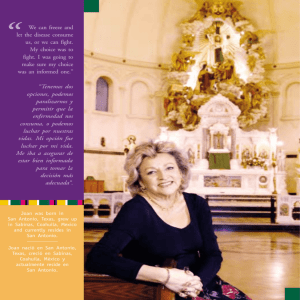
![3 war poetry wwii.CWK [v6.0]](http://s3.studylib.net/store/data/008813959_1-58f1f7d299afe9d284a6e988e1aa53fe-300x300.png)
